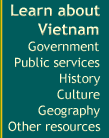Article 109
The Government is the executive organ of the National Assembly, the highest
organ of State administration of the Socialist Republic of Vietnam.
The Government shall carry out overall management of the work for the
fulfillment of the political, economic, cultural, social, national-defense, security
and external duties of the State; it shall ensure the effectiveness of the State
apparatus from the center to the grassroots; it shall ensure respect for and
implementation of the Constitution and the law; it shall promote the mastery of
the people in national construction and defense; it shall ensure security and the
improvement of the people's material and cultural living conditions.
The Government is accountable to the National Assembly and shall make its
reports to the National Assembly, its Standing Committee, and the country's
President.
Article 110
The Government shall be composed of the Prime Minister, the Deputy Prime
Ministers, the Cabinet Ministers, and other members. With the exception of the
Prime Minister, its members are not necessarily members of the National
Assembly.
The Prime Minister is accountable to the National Assembly and shall make his
reports to the National Assembly, its Standing Committee, and the country's
President.
The Deputy Prime Ministers shall assist the Prime Minister in the performance of
his duties, as required by him. In the absence of the Prime Minister, one of his
Deputies shall be delegated by him to direct the work of the government.
Article 111
The Chairman of the Central Committee of the Vietnam Fatherland Front, the
Chairman of the Vietnam Federation of Labour and the heads of mass
organisations shall be invited to attend the sessions of the Government when
relevant problems come up for discussion.
Article 112
Following are the duties and powers of the Government:
- To direct the work of the ministries, the organs of ministerial rank and the
organs of the Government, the People's Committees at all levels; to build
and consolidate the unified system of the apparatus of State
administration from the center to the grassroots; to guide and control the
People's Councils in their implementation of the directives of superior
organs of State administration; to create favourable conditions for the
People's Councils to fulfill their duties and exercise their powers as laid
down by law, to train, foster, dispose and use State officials and
employees;
- To ensure the implementation of the Constitution and the law in State
organs, economic bodies, social organisations, units of the armed forces,
and among the citizens; to organise and direct propaganda and
educational work among the people concerning the Constitution and the
law;
- To present draft laws, decree-laws and other projects to the National
Assembly and its Standing Committee;
- To ensure the overall management of the building and development of
the national economy; to carry into effect national financial and
monetary policies; to manage and ensure the effective use of property in
the ownership of the entire people; to promote the development of
culture, education, health care, science and technology; to carry out the
plan for socio-economic development and to give effect to the State
budget;
- To take measures to protect the rights and legitimate interests of the
citizen, to create conditions for him to exercise his rights and fulfill his
duties, to protect the property and interests of the State and society; to
protect the environment;
- To consolidate and strengthen national defense by the entire people and
the people's security; to ensure national security and social order; to
build the people's armed forces; to carry into effect general mobilisation,
to proclaim the state of emergency and all other necessary measures to
defend the country;
- To organise and direct the conduct of State inventories and statistics;
State inspection and control; to fight bureaucratism and corruption in
the State machinery; to settle complaints and denunciations by citizens;
- To ensure the overall management of the State's external relations; to
sign, join, approve international agreements on behalf of the
Government; to direct the implementation of international agreements
subscribed to or joined by the Socialist Republic of Vietnam; to protect
the interests of the State and the legitimate interests of Vietnamese
citizens and organisations in foreign countries;
- To implement social policies, nationalities policies, policies on religion;
- To take decisions in the adjustment of the boundaries of administrative
units below the level of the province and the city under direct central
control;
- To coordinate its efforts with those of the Vietnam Fatherland Front and
all mass organisations in the fulfillment of their duties and exercise of
their rights; to create conditions for their effective functioning.
Article 113
The tenure of the Government is the same as that of the National Assembly.
When the latter's tenure ends the Government shall continue in office until the
new legislature establishes a new Government.
Article 114
Following are the duties and powers of the Prime Minister:
- To direct the work of the Government, the Government members, the
People's Councils at all levels; to chair Cabinet meetings;
- To propose to the National Assembly to set up or disband ministries and
organs of ministerial rank; to present to the National Assembly or, when
the latter is not in session, to its Standing Committee, for approval,
proposals on the appointment, release from duty, or dismissal of Deputy
Prime Ministers, Cabinet Ministers and other members of the
Government;
- To appoint, release from duty, or dismiss Vice-Ministers and officials of
equal rank; approve the election, release from duty, secondment, and
dismissal of Chairmen and Deputy Chairmen of People's Committees of
provinces and cities under direct central rule;
- To suspend or annul decisions, directives and circulars of Cabinet
Ministers and other Government members, decisions and directives of
People's Councils and Chairmen of People's Committees of provinces
and cities under direct central rule that contravene the Constitution, the
law, and other formal written documents of superior State organs;
- To suspend the execution of resolutions of People's Councils of
provinces and cities under direct central rule that contravene the
Constitution, the law, and formal written orders of superior State organs;
at the same time to propose to the Standing Committee of the National
Assembly to annul them;
- To make regular reports to the people through the mass media on major
issues to be settled by the Government.
Article 115
On the basis of the Constitution, the law, and the resolutions of the National
Assembly, the decree-laws and resolutions of the latter's Standing Committee,
the orders and decisions of the country's President, the Government shall issue
resolutions and decrees, the Prime Minister shall issue decisions and directives
and shall supervise the execution of those formal written orders.
Major issues within the jurisdiction of the Government shall undergo collegial
discussion and decisions shall be taken in conformity with the will of the
majority.
Article 116
Cabinet Ministers and other Government members shall be responsible for State
administration in the fields and branches under their respective authority
throughout the country; they shall ensure the autonomy of grassroots units in
production and trading according to the provisions of the law.
On the basis of the Constitution, the law, and the resolutions of the National
Assembly, the decree-laws and resolutions of the latter's Standing Committee,
the orders and decisions of the country's President, the written orders of the
Government and the Prime Minister, the Cabinet Ministers, the other
Government members, the heads of government organs shall issue decisions,
directives and circulars and shall control the execution of these formal written
instructions by all branches, regions and grass roots units.
Article 117
Cabinet Ministers and the other Government members shall be responsible to
the Prime Minister and the National Assembly for the fields and branches under
their respective authority.











